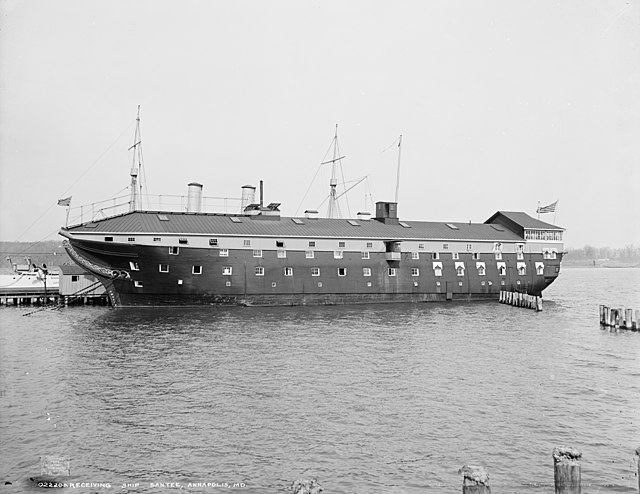Loading AI tools
Watercraft serving as floating personnel accommodation From Wikipedia, the free encyclopedia
A barracks ship or barracks barge or berthing barge, or in civilian use accommodation vessel or accommodation ship, is a ship or a non-self-propelled barge containing a superstructure of a type suitable for use as a temporary barracks for sailors or other military personnel. A barracks ship, a military form of a dormitory ship, may also be used as a receiving unit for sailors who need temporary residence prior to being assigned to their ship. The United States Navy used to call them Yard Repair Berthing and Messing with designations YRBM and YRBM(L)[1] and now classes them as either Auxiliary Personnel Barracks (APB) or Auxiliary Personnel Lighter (aka barge) (APL).[2]
This article has multiple issues. Please help improve it or discuss these issues on the talk page. (Learn how and when to remove these messages)
|





Barrack ships were common during the era of sailing ships when shore facilities were scarce or non-existent. Barrack ships were usually hulks. At times, barrack ships were also used as prison ships for convicts, prisoners of war or civilian internees.
Barracks ships in the combat area provided necessary residence for sailors and merchantmen whose ship had been sunk, or whose ship had been so damaged that on-board berthing was no longer possible. They were also used as accommodation at advanced bases, and as mobile barracks for units such as construction battalions. Occasionally, they would be used for other roles such as providing office space.
APL were non-self-propelled barracks ships, which were used by the United States Navy in forward areas during World War II, especially in the Pacific Ocean, and were designated APL, such as APL-18 which was commissioned in 1944 and had the following specifications for APL-1 to APL-58:
The APL-17-class barracks ship covered APL-17 to APL-40 with APL-35 to APL-40 converted to become Benewah-class barracks ships.
Transport ships were also used as barracks by other war-time navies, such as the Kriegsmarine's SS General San Martin. One of the two abortive Jade class auxiliary aircraft carriers (Elbe) was also converted into a barracks ship.
The United Kingdom used barracks ships to help garrison the Falkland Islands after it ousted the Argentinian occupation force in the 1982 Falklands War. The former car ferries MV St Edmund and TEV Rangatira were deployed to Port Stanley in 1982, and Rangatira stayed until September 1983.[3]
Rangatira is also an example of a civilian accommodation ship. She and another former ferry, MV Odysseus, housed workers who built an oil platform in Loch Kishorn in Scotland in 1977–1978, and Rangatira housed workers who built Sullom Voe Terminal in the Shetland Islands in 1978–1981.[3]
A large number of United States Navy barges survived World War II[4] and continued to act in a support role. Some were used by the "Brown Water Navy" of the United States during the Vietnam War as bases for specialized river boats. The barge YRBM-18 (later renamed to APL-55) received the Presidential Unit Citation for service during the Vietnam War from 6 December 1968 to 31 March 1969.
The following Yard Repair types have been created:[4]
The YRB and YRBM barges were renames as Auxiliary Personnel Lighters (APL)[2] and are available to temporarily house personnel off ships. The 70 ships are assigned to the Naval Sea Systems Command (NAVSEA) to bases around the world (Norfolk and Portsmouth, Virginia; San Diego; Bremerton, Washington ; Mayport, Florida; Pearl Harbor, Hawaii; Yokosuka and Sasebo in Japan; and Guam).
The United States Navy placed a contract for two APL 65 berthing barges in August 1998 which were delivered to the Navy in November and December 2000. The APL 65 berthing barges include post office, barber shop, bank, classrooms, laundry, medical facilities and fitness services.[5]
The older berthing barges are being replaced by five newer ships of the APL 67 class which are being purpose built by VT Halter Marine.[5][6] The first contract was awarded in September 2018 with APL 67 launched in June 2020 and delivered to the USN in August 2021 followed by APL 68 which was delivered in November 2021.[7][8]
The APL67 fleet is planned to be 14 in total. 26 'medium' APLs are also planned.[9]
On 21 November 2022, the Navy accepted APL68, saying it would support the impending USS Harry S. Truman carrier repair cycle.[9]
Seamless Wikipedia browsing. On steroids.
Every time you click a link to Wikipedia, Wiktionary or Wikiquote in your browser's search results, it will show the modern Wikiwand interface.
Wikiwand extension is a five stars, simple, with minimum permission required to keep your browsing private, safe and transparent.